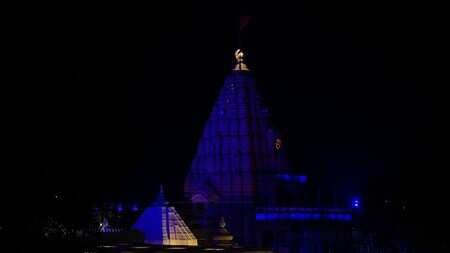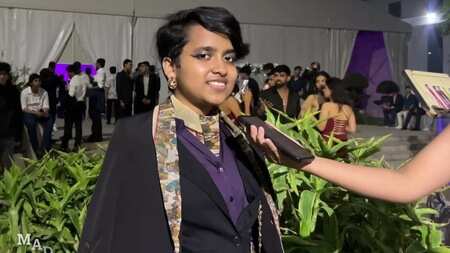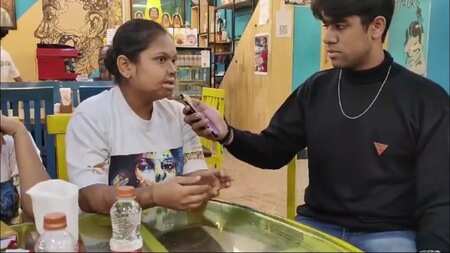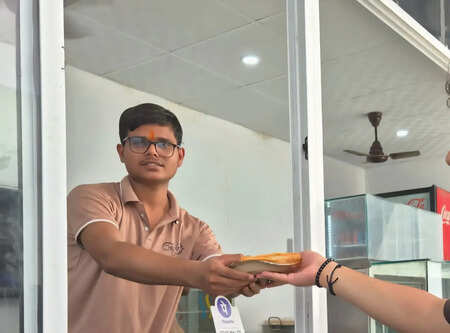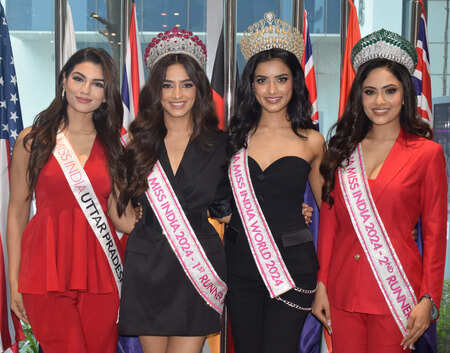The Renewal Nobody Asked For? Why Netflix's Nobody Wants This Needs to Reclaim Its Daring in Season 3
Times of Bennett | Updated: Nov 08, 2025 19:40
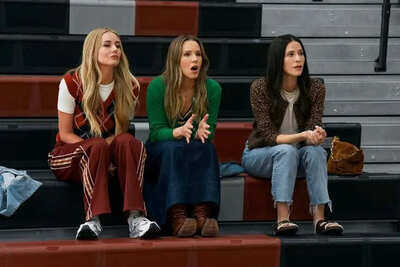
Correspondent : Kanishka Shukla
Love was never the problem, compromise was.
"Nobody Wants This ," the Netflix rabbinical rom-com starring Adam Brody (Noah ) and Kristen Bell (Joanne), was a delightful, daring surprise in its first season. It captivated audiences by trading cliché for conflict, presenting a refreshing and honest look at an agnostic sex podcaster falling for a modern Orthodox rabbi. The original premise was pure, charming gold: two completely disparate people choosing each other over their established worlds.

However, the recently announced Season 3 renewal, following a distinctly frustrating and confused Season 2—forces us to ask: Why do these two people still want this, and more importantly, why does the series keep confusing the audience about what the core conflict actually is?
Season 1’s climax was a beautiful, chaotic act of devotion: Noah choosing Joanne, the “Shiksa”, over his dream job as head rabbi. It was the ultimate statement of unconditional love.

Season 2, bewilderingly, rewrites this narrative. Instead of exploring the complex reality of their interfaith relationship, the show made Joanne’s conversion toJudaism its central, frustrating deadline. This shift felt like a betrayal of Season 1’s promise. The narrative became less about two distinct individuals making space for one another, and more about one person being relentlessly pushed to conform.
The worst offender? Noah’s continued pressure for Joanne to convert, even after he lands a new, progressive rabbi job, and even after Joanne sensitively broke up with him to save his initial career.
This dynamic makes their relationship feel less like a true partnership and more like a transactional, time-sensitive project. The charm dissolves, replaced by the discomfort of watching an independent woman (who communicates her needs beautifully) be steamrolled by the weight of tradition.
While the central romance floundered, the supporting cast, especially Bina Roklov (Noah’s mother)—remained the show’s MVP.
Bina is a masterful, multi-layered creation: a hyper-protective, traditional matriarch with her own secret faults (the infamous dustbin food incident). Her “gangsta” personality and unflinching disapproval of Joanne provide the necessary external tension.

Yet, the show struggles to decide if Bina loves or hates Joanne. She flip-flops from contempt to reluctant admiration to renewed hostility in a single episode. But this inconsistency is what makes her so brilliant, her chaos mirrors the audience’s own uncertainty about Noah and Joanne’s future. It’s a realistic portrayal of familial acceptance, where progress is often followed by emotional backsliding.
In a series about a love story that feels increasingly fraught, the most positive, compelling relationship is the “loser siblings” connection between Noah’s brotherSasha (Timothy Simons ) and Joanne’s sister Morgan (Justine Lupe).
Their platonic bond, from conspiring to break into a phone to sharing vulnerable doubts, provides the emotional anchor. They’re the only relationship that seems to progress genuinely and positively.
Sasha’s wisdom, his painful separation from Esther gives him an unexpected clarity about relationships, contrasting Noah’s conditional love. Meanwhile, Morgan’s chaos, her messy, humorous self-awareness grounds the show’s emotional beats, offering balance when the central couple’s drama becomes exhausting, including her never ending support for her sister.
Somewhere along the way, Joanne stops being her own person and starts being everyone else’s project. Keeping Noah aside, she’s constantly being gaslighted—by almost everyone in the series, into believing she’s already “basically Jewish.” The Season 2 finale drives this home when Esther tells Joanne she’s “overcomplicating” what it means to be Jewish, insisting that Joanne already carries “the traits of the tribe”, being obsessed with her family, getting into everyone’s business, caring too much.

It’s a strangely ironic moment: the show stops exploring love across faiths and instead turns into a manual on how to be Jewish. The line between religion and personality blurs so much that you’re left wondering, who isn’t obsessed with their family and doesn’t get into other people’s business? By the end of Season 2, everyone feels Jewish!
This exact conversation makes Joanne realize that she wants to be a Jew for herself and not for Noah. Season 2 lost its focus on the podcast which was a defining part of the series as well as Joanne’s life.
Season 2 was messy, confusing, and filled with adults making regressive, teenage-level decisions. The grand rom-com ending felt unearned because the conversion conflict was never truly resolved.
For Nobody Wants This to justify its renewal, Season 3 must reclaim the emotional intelligence and chaos of Season 1, by letting Noah and Joanne exist as equals again. It needs to embrace the truth that love doesn’t always mean assimilation, give Joanne her full agency, and lean into the show’s best element: its flawed, funny ensemble that understands heartbreak better than its leads do.
Because ultimately, Nobody Wants This isn’t about whether Noah and Joanne end up together, it’s about whether love can survive without losing yourself in the process.
The writer is a second-year BA Mass Communication student, passionate about storytelling, media trends, and
pop culture analysis. She loves exploring the intersection of fashion, culture, and communication through writing. An avid reader and lifelong learner, she spends her free time discovering new books, binge-watching movies and series , experimenting with creative projects, and hunting for the next viral internet moment.
Love was never the problem, compromise was.
"

However, the recently announced Season 3 renewal, following a distinctly frustrating and confused Season 2—forces us to ask: Why do these two people still want this, and more importantly, why does the series keep confusing the audience about what the core conflict actually is?
Season 1’s climax was a beautiful, chaotic act of devotion: Noah choosing Joanne, the “Shiksa”, over his dream job as head rabbi. It was the ultimate statement of unconditional love.

Season 2, bewilderingly, rewrites this narrative. Instead of exploring the complex reality of their interfaith relationship, the show made Joanne’s conversion to
The worst offender? Noah’s continued pressure for Joanne to convert, even after he lands a new, progressive rabbi job, and even after Joanne sensitively broke up with him to save his initial career.
This dynamic makes their relationship feel less like a true partnership and more like a transactional, time-sensitive project. The charm dissolves, replaced by the discomfort of watching an independent woman (who communicates her needs beautifully) be steamrolled by the weight of tradition.
While the central romance floundered, the supporting cast, especially Bina Roklov (Noah’s mother)—remained the show’s MVP.
Bina is a masterful, multi-layered creation: a hyper-protective, traditional matriarch with her own secret faults (the infamous dustbin food incident). Her “gangsta” personality and unflinching disapproval of Joanne provide the necessary external tension.

Yet, the show struggles to decide if Bina loves or hates Joanne. She flip-flops from contempt to reluctant admiration to renewed hostility in a single episode. But this inconsistency is what makes her so brilliant, her chaos mirrors the audience’s own uncertainty about Noah and Joanne’s future. It’s a realistic portrayal of familial acceptance, where progress is often followed by emotional backsliding.
In a series about a love story that feels increasingly fraught, the most positive, compelling relationship is the “loser siblings” connection between Noah’s brother
Their platonic bond, from conspiring to break into a phone to sharing vulnerable doubts, provides the emotional anchor. They’re the only relationship that seems to progress genuinely and positively.
Sasha’s wisdom, his painful separation from Esther gives him an unexpected clarity about relationships, contrasting Noah’s conditional love. Meanwhile, Morgan’s chaos, her messy, humorous self-awareness grounds the show’s emotional beats, offering balance when the central couple’s drama becomes exhausting, including her never ending support for her sister.
Somewhere along the way, Joanne stops being her own person and starts being everyone else’s project. Keeping Noah aside, she’s constantly being gaslighted—by almost everyone in the series, into believing she’s already “basically Jewish.” The Season 2 finale drives this home when Esther tells Joanne she’s “overcomplicating” what it means to be Jewish, insisting that Joanne already carries “the traits of the tribe”, being obsessed with her family, getting into everyone’s business, caring too much.

It’s a strangely ironic moment: the show stops exploring love across faiths and instead turns into a manual on how to be Jewish. The line between religion and personality blurs so much that you’re left wondering, who isn’t obsessed with their family and doesn’t get into other people’s business? By the end of Season 2, everyone feels Jewish!
This exact conversation makes Joanne realize that she wants to be a Jew for herself and not for Noah. Season 2 lost its focus on the podcast which was a defining part of the series as well as Joanne’s life.
Season 2 was messy, confusing, and filled with adults making regressive, teenage-level decisions. The grand rom-com ending felt unearned because the conversion conflict was never truly resolved.
For Nobody Wants This to justify its renewal, Season 3 must reclaim the emotional intelligence and chaos of Season 1, by letting Noah and Joanne exist as equals again. It needs to embrace the truth that love doesn’t always mean assimilation, give Joanne her full agency, and lean into the show’s best element: its flawed, funny ensemble that understands heartbreak better than its leads do.
Because ultimately, Nobody Wants This isn’t about whether Noah and Joanne end up together, it’s about whether love can survive without losing yourself in the process.
The writer is a second-year BA Mass Communication student, passionate about storytelling, media trends, and
pop culture analysis. She loves exploring the intersection of fashion, culture, and communication through writing. An avid reader and lifelong learner, she spends her free time discovering new books, binge-watching movies and series , experimenting with creative projects, and hunting for the next viral internet moment.

